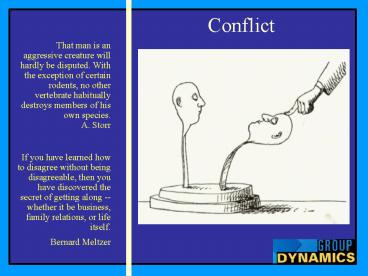Intragroup Conflict - PowerPoint PPT Presentation
1 / 19
Title:
Intragroup Conflict
Description:
Conflict. That man is an aggressive creature will hardly be disputed. ... certain rodents, no other vertebrate habitually destroys members of his own species. ... – PowerPoint PPT presentation
Number of Views:819
Avg rating:3.0/5.0
Title: Intragroup Conflict
1
Conflict
That man is an aggressive creature will hardly be
disputed. With the exception of certain rodents,
no other vertebrate habitually destroys members
of his own species. A. Storr If you have
learned how to disagree without being
disagreeable, then you have discovered the secret
of getting along -- whether it be business,
family relations, or life itself. Bernard
Meltzer
2
Assumptions and Opinions
- Some people are always itching for a fight.
- People who are aggressive are mentally unstable.
- The human species is, by nature, aggressive.
- Women are the gentler gender.
- The best way to deal with conflict is to talk
things over.
3
What is Conflict?
- Examples of conflict situations
- Definition Disagreement, discord and friction
that occur when the actions or beliefs of one or
more members of the group are unacceptable to and
are resisted by one or more of the other group
members
4
What is Conflict?
- Types
- Intergroup conflict involves two or more groups
- Intragroup conflict occurs within a group
- The course of
- conflict
5
Roots of Conflict
- Conflict questions
- Who has won (competition)?
- Who gets what (resource distribution)?
- Who is in charge (power struggles)?
- Who decides (decisional conflict)?
- Who do I like (personal conflict)?
6
Winning
- Conflict and competition
- Deutsch Cooperation versus competition
- Mixed-motive conflict and the prisoners dilemma
game (PDG)
7
Don
Confesses
Doesnt Confess
0 years
1 years
Doesnt confesses
10 years
1 years
Claire
10 years
5 year
Confesses
5 year
0 years
- Prisoners Dilemma Game
8
Don
Choice B
Choice A
50
25
Choice A
- 25
25
Claire
- 25
- 10
Choice B
-10
50
- Prisoners Dilemma Game
9
Winning
- Conflict and competition
- The norm of reciprocity
- Social values orientation cooperators,
competitors, and individualists - Sex differences
10
Sharing
- Sharing Social dilemmas
- Groups as social dilemmas Self-interest
(self-serving) vs. group interest (group-serving) - Types
- Social traps (commons dilemmas) exploiting
shared resources - Public goods dilemmas contributions to public
goods (free-riding) - Fairness dilemmas distributive vs. procedural
justice, distribution norms - Responsibility dilemmas egocentrism vs.
sociocentrism
11
Sources of Conflict in Groups
- Controlling Power struggles
- Deciding Substantive vs. procedural conflicts
- Liking and disliking Personal conflicts
- Attraction decreases conflict but disaffection
(repulsion) increases conflict - Conflict and diversity in groups
- Balance theory members respond negatively when
they disagree with those they like
12
Why Does Conflict Escalate?
- Uncertainty ? Commitment
- Perception ? Misperception
- Fundamental attribution error
- Misperceptions of motives
- Weak Tactics ? Stronger Tactics
- Trucking game experiment (Deutsch Krauss, 1960)
- Communication can increase conflict if used to
threaten
13
- Deutsch Krauss Trucking Game
14
- Reciprocity ? Upward Conflict Spiral
- Norm of reciprocity
- Rough (overmatching) and light reciprocity
(undermatching) - Few ? Many (coalition formation)
- Irritation ? Anger (contagion)
15
Conflict Management
- Commitment ? Negotiation
- Finding solutions by negotiating
- Types soft, hard, and principled negotiators
- Misperception ? Understanding
16
- Strong Tactics ? Cooperative Tactics
- Types of tactics Avoiding, yielding, fighting,
and cooperating - Dimensions negative-positive and active-passive
- Upward ? Downward Conflict Spirals
- Axelrods Tit for Tat strategy (TFT)
- Characteristics provocable, reciprocal,
forgiving
17
- Many ? Few
- Mediators third party interventions
- Types inquisitorial, arbitration, moot
- Anger ? Composure
18
Does Conflict, When Resolved, Lead to Improved
Group Functioning?
- Conflict is a natural consequence of joining a
group - Cooperation promotes group unity, harmony,
conflict undermines the group - Resolving non-personal conflicts may promote
group functioning, but unclear
19
In Sum
- 1. Uncertainty ? Commitment ? Negotiation
- 2. Perception ? Misperception ? Understanding
- 3. Weak Tactics ? Stronger Tactics ? Cooperative
Tactics - 4. Reciprocity ? Upward Conflict Spiral ?
Downward spiral - 5. Few ? Many (coalition formation) ? Few
- 6. Irritation ? Anger (contagion) ? Composure































